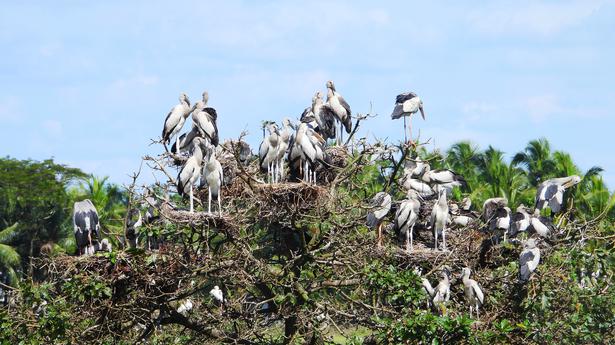
Asian openbill leaves no room for other migrants at Tirunavaya
The Hindu
A study shows that the population of the species doubled over a year
The trees in the wetlands of Tirunavaya are chock-a-block with nesting colonies of migrant birds that reach there from different parts of the country. The Asian openbill stork, the most predominant species found at Tirunavaya, has conquered most of the tree canopies in the midst of the wetlands in such a way as to drive away several other migrant species.
A study conducted among the Asian openbill at Tirunavaya shows that the population of the species doubled over a year, kicking out species like Black-headed ibis, Oriental darter, Black-crowned night heron, Little cormorant, and Purple heron.
The permanent wetlands in Pallar region of Tirunavaya spread over 25 hectares, where lotus cultivation takes places on a commercial basis, are a safe breeding ground for several local migrant birds. The availability of trees such as screwpine and Pride of India or Poomaruthu in the midst of the wetlands with little access for people has enticed the migrant birds to Pallar.
However, the felling of the trees, especially the screwpine, for firewood and other purposes as well as a sudden increase in the population of the Asian openbill has begun to pose a threat many migrant birds.
Srinila Mahesh, who observed the movement of migratory birds at Tirunavaya in the last few years as part of her doctoral study on Asian openbill’s breeding ecology, said that it was strange to find the Asian openbills invading nests of Black-headed ibis at Pallar. “Black-headed ibis and Oriental darter are two near-threatened bird species that we could find in the wetlands of Tirunavaya. But the Asian openbill appears to colonise the entire trees in the midst of the wetlands,” said Ms. Srinila.
Buttressing her claims, local birdwatcher and teacher Salman Karimbanakkal said that he observed a sharp fall in the presence of other species after the invasion of the Asian openbill. “We used to observe several species, including Oriental darter and Black-headed ibis. But they are sadly missing now apparently because of the Asian openbill dominance and the depletion of trees within the wetlands,” said Mr. Salman.
They suggested that an afforestation drive by planting trees like Pride of India or Poomaruthu would help strengthen not only the wetland ecology, but also the breeding ecology of hundreds of migrant birds. “Apart from the availability of food, what provides sanctuary for the migrants is the presence of nesting trees in the midst of the wetland with few terrestrial predators,” said Ms. Srinila.

The girl, who was admitted to Aster CMI Hospital with alarming breathlessness and significant pallor, was diagnosed with Wegener’s Granulomatosis (now known as Granulomatosis with Polyangiitis or GPA), a rare autoimmune condition that causes spontaneous bleeding in the lungs, leading to acute respiratory failure.

ACB files case against IPS officer N. Sanjay in Andhra Pradesh. The official is accused of manipulating the tender processes for awarding contract for development and maintenance of AGNI-NOC portal, and conducting awareness meetings for SC/STs. It is alleged that the total value of properties stolen, or involved in the case is estimated at ₹1,75,86,600.









